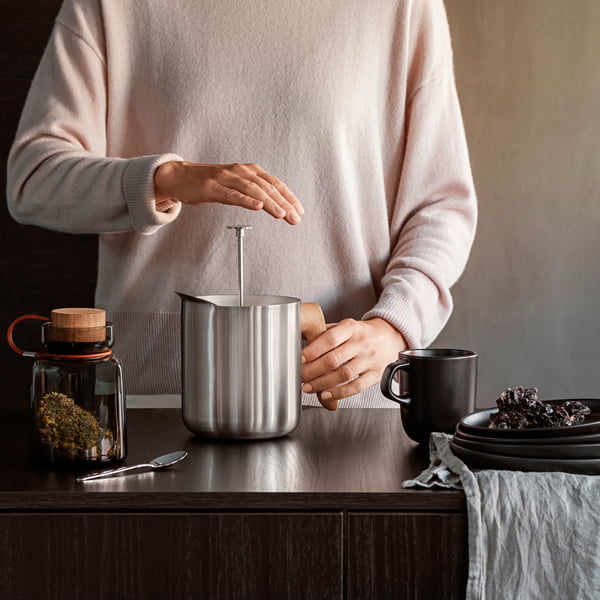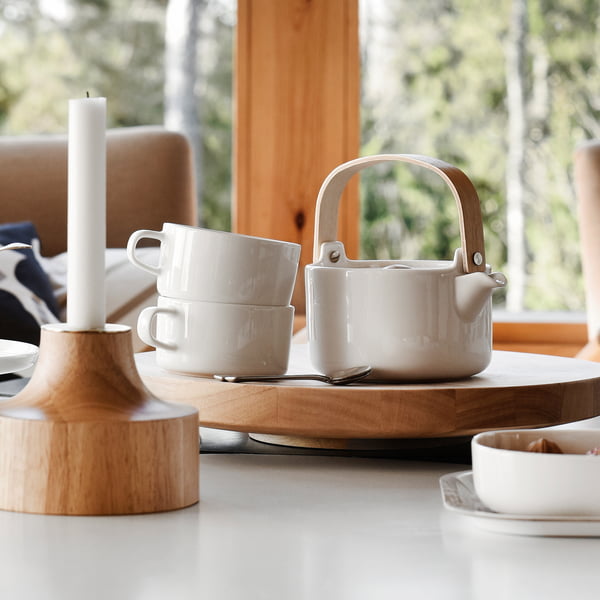Buying teapot and tea accessories - here's what you should look for
- The shape of the teapot
- Practical tea accessories
- The right material
- The capacity
- Cleaning teapots properly
- Conclusion
1. The shape of the teapot
Why are teapots bulbous?
The more bulbous a teapot is, the better the aroma of the tea leaves can develop in the water. The flavors are more likely to remain at the bottom and can be optimally distributed there.
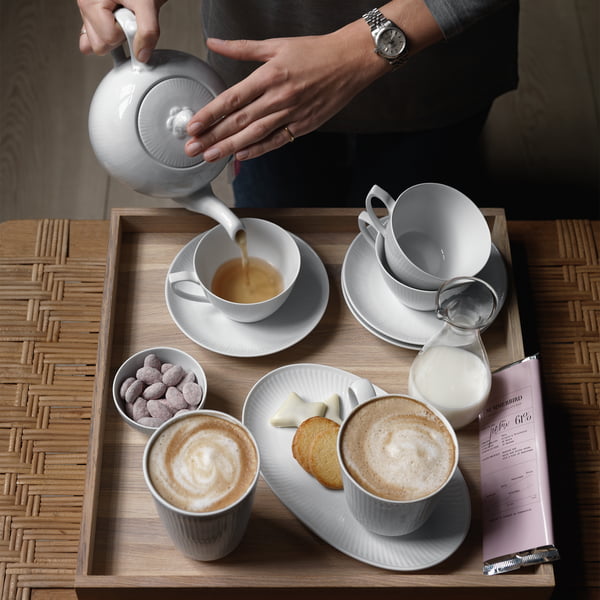
In contrast to coffee pots, the spout of tea pots is set very low. This allows the concentrated flavors and tannins that have accumulated in the lower part of the pot to be poured directly into the tea cup and not remain at the bottom.
In addition, there is only a small lid opening , so that little air gets to the tea and it stays warm longer.
2. Practical tea accessories
Teapot with strainer
Many models have an integrated tea strainer. This is particularly suitable for brewing loose tea , that is, without a tea bag. When buying, make sure that the strainer hangs low enough in the pot and at best can be removed after the brewing time.
Tea infuser
Alternatively Tea strainers available individually. A smaller tea infuser is particularly practical if you only want to drink one cup of tea and it can be prepared directly in the cup.
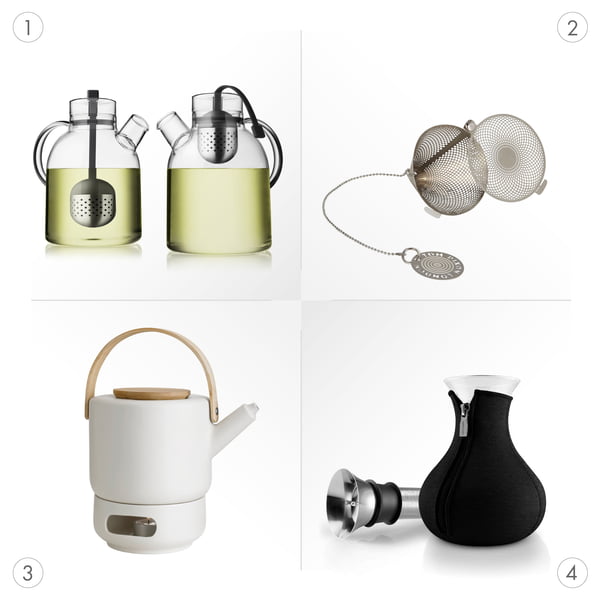
Teapot with teapot warmer
With a Teapot warmer , which is heated by a candle, the tea can be kept warm for a long time . In addition, it should be borne in mind that the tea infuses and can thus change its taste. Available are pots with integrated teapot warmer. Buy the teapot warmer separately, then make sure that the dimensions of the teapot and the teapot warmer fit together.
Alternatively, there are also design teapots with an insulating teapot warmer, which is pulled over the pot and thus keeps the tea warm.
Tea maker
A Tea Maker is a vessel that looks like a teapot. It has a strainer insert into which loose tea leaves are poured and then boiling water is poured over them. Tea makers can be found among others at the manufacturer Bodum .
Some designs are designed so that the strainer is simply pressed down after the brewing time. This allows you to finish the brewing process without having to remove the strainer. You can pour the tea into a designer teapot or practical thermos , depending on your preference.
Most tea makers are versatile and can also be used as coffee makers or without a strainer insert as a kettle.
3. Materials in comparison
When choosing a teapot, you should consider not only the design, but also the different properties of the material.
Glass : Teapots made of glass are particularly uncomplicated and universally suitable for any type of tea, because no odor and flavor residues adhere to glass . Due to the transparency of the material, the coloration and thus the strength of the tea can be observed and influenced during the brewing process. Double-walled glass is insulating , in that the heat is not felt from the outside and tea stays hot longer inside. Combined with the matching glass cups and glass mugs, the design of the teapot looks simple and elegant.
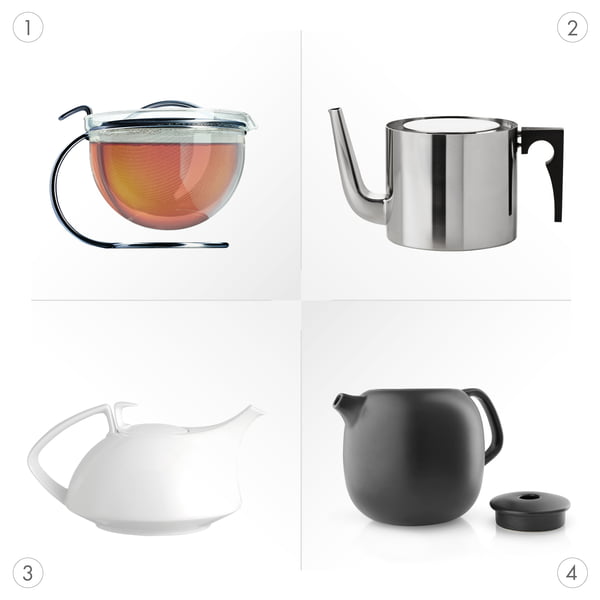
Stainless steel : Stainless steel and cast iron teapots are known to retain heat for a long time . Since the stainless steel teapots after some time the taste of the tea on, they are best suited for the preparation of similar teas .
Porcelain : Porcelain teapots remain odorless and tasteless , so they are suitable for serving different teas. However, porcelain is not so good at retaining heat. Therefore, the additional use of a teapot warmer is recommended .
Traditional teapots are made of porcelain. The thinner the material, the more noble and valuable they look. A thin-walled porcelain teapot is an eye-catcher and goes well with teas with light floral aromas, green tea or herbal tea.
Ceramics : Ceramics have become popular for everyday tableware because they are very sturdy as well as heat resistant and easy to clean . Over time, the unglazed interior of ceramic or clay teapots takes on the smell and taste of the tea. This so-called patina enhances the aroma of black tea, for example. Therefore, a ceramic teapot should best be used for one type of tea , to prevent mixing of flavors.
 "Whether festive tea ceremony according to Japanese model, East Frisian tea with Kluntje and a blob of cream or oriental sweet and fragrant - tea drinking is an integral part of the culture in many countries of the world. It is becoming increasingly popular in this country. Maybe a small mindful ritual like a tea ceremony is something for you, too?" - Kerstin, interior design expert
"Whether festive tea ceremony according to Japanese model, East Frisian tea with Kluntje and a blob of cream or oriental sweet and fragrant - tea drinking is an integral part of the culture in many countries of the world. It is becoming increasingly popular in this country. Maybe a small mindful ritual like a tea ceremony is something for you, too?" - Kerstin, interior design expert
4. The right capacity
Generally available are pots with a capacity between 0.5 and 2 liters . The right size depends on your personal needs.
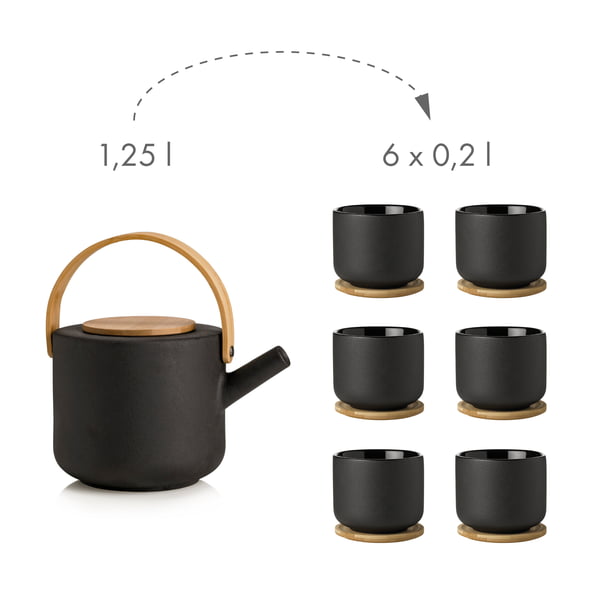
Think about how many cups you want to get out of a teapot. Then the capacity of the cups is also interesting , which you want to use.
Do you drink a lot of tea yourself or do you often have visitors? The more tea is drunk, the larger the pot should be and be able to fill many cups accordingly. With a Teapot warmer you keep the tea warm for a long time.
5. How to clean teapots properly
Generally, teapots clean well by simply rinsing with hot water . Teapots made of glass and stainless steel can often be put in the dishwasher. Whether a teapot is dishwasher safe, you can find at Connox in the properties on the article pages. The tea strainers can often be cleaned separately .
The use of dishwashing detergent is not recommended . On the one hand, residues from the detergent can adulterate the taste, on the other hand, without the use of detergent, a patina develops over time, which can serve as a flavor enhancer for tea lovers.
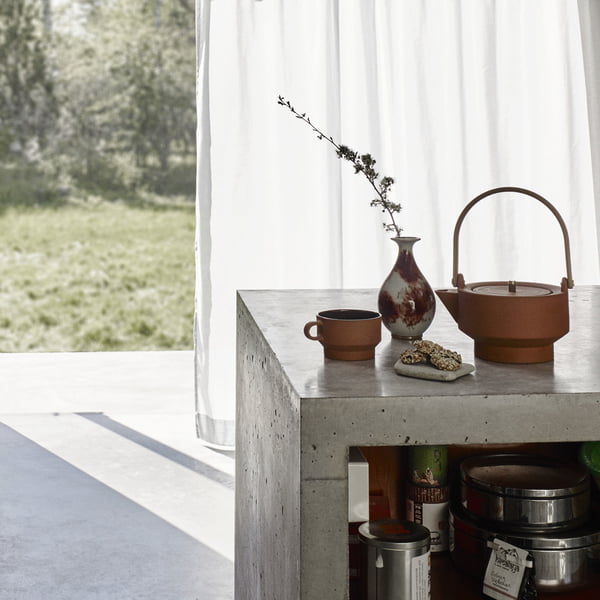
In hard-to-reach places, stubborn rims from black tea or herbal teas can be removed with a soft brush and table salt dissolved in water. Also popular for cleaning are denture cleaner tabs or baking soda, which are soaked in the teapot together with water. After one to two hours, the residue can be removed with a sponge.
Please also always follow the manufacturer's care tips.
6. Conclusion - what you can consider when buying a designer teapot and tea accessories online.
- Teapots are rather bulbous, have a deep spout and a small lid - so the aroma of the tea leaves can best distribute in the water and the tea stays warm longer
- If loose tea is preferred, a teapot with an integrated tea strainer is recommended. Alternatively, tea strainers and smaller tea infusers are also available separately. An additional teapot warmer keeps the tea warm.
- When it comes to size, the deciding factor is how much tea you drink and how often the teapot is used. The more tea is drunk, the larger the teapot should be.
- For teapots, the properties of the material in particular are crucial. Do you like to try different teas? Then you should choose a teapot made of glass or porcelain. Drink to preferably a variant tea, then stainless steel, cast iron, clay or ceramics also come into question. Should the pot keep the tea warm as long as possible? Then choose a pot made of stainless steel. But also pots made of double-walled glass or
- No matter what material the teapot is made of, for cleaning the pot should only be rinsed with hot water. Glass teapots are often also dishwasher safe.
Teapots and accessories buy online at Connox - your advantages at a glance
- High-quality teapots - originals of the top design brands
- Climate neutral online shopping
- Personal support by our customer service
- Fair shipping costs
- Secure payment thanks to SSL encryption
- Only 1 - 2 working days delivery time
Shopping advice at Connox
You want to buy design teapots online but need assistance? Feel free to contact our customer service at any time. We are available to help you with your purchase, give recommendations and can quickly clarify questions. Then let us conveniently deliver your desired item directly to your home.
